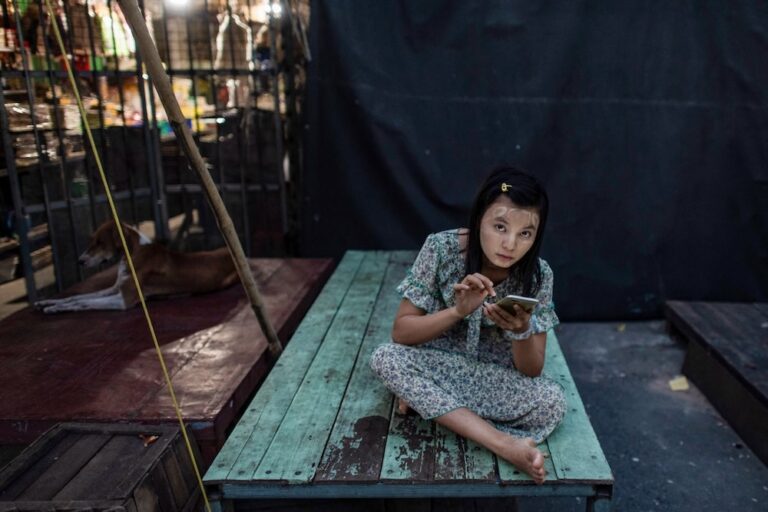(SEAPA/IFEX) – The following is a SEAPA capsule report: Exiled Burmese journalists live dangerously and need protection A growing friendship between Burma’s military junta and its neighbors, based mostly on shared economic interests, has dire implications for Burmese living in Thailand, India and Bangladesh, particularly journalists who have little in terms of protection or recognition […]
(SEAPA/IFEX) – The following is a SEAPA capsule report:
Exiled Burmese journalists live dangerously and need protection
A growing friendship between Burma’s military junta and its neighbors, based mostly on shared economic interests, has dire implications for Burmese living in Thailand, India and Bangladesh, particularly journalists who have little in terms of protection or recognition of their rights.
The deteriorating political conditions in Burma, along with the continuing crackdown on political dissidents and severe press censorship in Rangoon, have caused anxiety among the exiled Burmese groups. Adding to their woes is the seemingly changing policy of Burma’s neighbors towards the pro-democracy movement, leaving the exiled Burmese activists and journalists more vulnerable to harassment and crackdowns.
These vulnerabilities were highlighted at a seminar held on Oct 31-Nov 1 in Thailand, attended by some 50 Burmese journalists working in Bangladesh, China, India and Thailand, as well as media support groups from south and southeast Asia. They shared concerns that increased harassment by authorities in the host countries has worsened the security and working conditions of Burmese journalists in the border areas. Protection and some kind of recognition of the journalists’ status have become essential, they said.
The seminar was organized as a venue to address security concerns of the journalists and to explore practical solutions to ensure that they are able continue to work with better safeguards. Among the proposed measures was a lobby of host governments and local or national press associations so that Burmese exiles can be given proper professional accreditation.
“Despite all this uncertainty, it is high time that Burmese exiled journalists come above ground and dare to discuss about their rights,” said Roby Alampay, executive director of the Southeast Asian Press Alliance (SEAPA), a leading defender of press freedom and free expression in the region.
Seminar participants were told that a Chittagong-based Burmese news group, Kaladan Press Network, was forced to close down its office in October following a crackdown on a group of Burmese-Muslim Rohingyas in exile in Bangladesh. Members of the group were arrested during a religious gathering and detained without charge.
United Nations High Commissioner for Refugees (UNHCR) officials have “frankly advised” Burmese journalists in Bangladesh to keep a low profile. Prior to the closure of the Kaladan office, the journalists often received threats from local police, according to a Bangladeshi speaker who spoke at the seminar.
In Thailand, some Burmese journalists have faced increasing harassment by local authorities. In October, a Burmese stringer working for the Oslo-based Burmese broadcasting network Democratic Voice of Burma (DVB), was forced to leave his home in Ranong province for fear of his life. This followed a raid on his home by unidentified Thai and Burmese officers. Another DVB stringer in Ranong is facing similar harassment.
In India, exiled Burmese journalists in the capital, New Delhi, have relatively better conditions, given the country’s strong and vibrant civil society, but those operating in border areas face constant threats and harassment from armed groups operating on both sides of India’s northeastern border, according to an Indian journalist at the seminar.
There are about 20 Burmese news organizations operating around the country’s borders in south and southeast Asia, most of them along the Burma-Thailand border. The majority emerged in the late 1990s and early 2000. Most of the journalists work for small Burmese groups, although some are affiliated with the London-based British Broadcasting Corp, Washington-based Voice of America and Radio Free Asia and the Oslo-based DVB. Many do not have legal documents, although some either carry special travel documents and passes issued by the host countries or have a foreign passport. Only a few are recognized as people of concern (POC) and thus receive protection under the UNHCR.
The ambiguity in their rights and legal status clearly poses obstacles to the practice of their profession, as access to information as well as mobility are restricted. They are allowed by their host countries to stay on for humanitarian reasons as long as they do not engage in political activities.
But Burma watchers note recent shifts in the foreign policy of Burma’s neighbors, a worrying development for Burmese in exile.
“There is direct correlation between Delhi’s improving relationship with the Burmese junta and the generals and the lack of support for Burma’s pro-democracy movement by the Indian government. That is bad news for Burmese journalists in exile in India,” according to Subir Bhaumik, a BBC correspondent in east India.
Kavi Chongkittavorn, deputy group editor of the Bangkok-based Nation Group, says that while Prime Minister Thaksin Shinawatra’s government has become quite cosy with the government in Rangoon, Thailand will continue to have an open mind towards the pro-democracy movement given the international community’s stance on the issue.
He also noted that a recent meeting between US President George Bush and Shan human rights activist Charm Tong in Washington signaled a renewed impetus in international efforts to push for political reforms and democracy in Burma.


